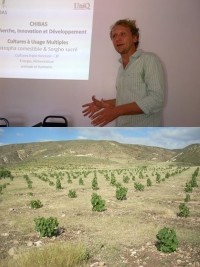|
||||||||||||||||||
| Download the revised decree and electoral calendar, published in the official journal |
|
|
Haiti - Agriculture : Towards one of the largest agro-industrial sectors of Haiti 12/02/2014 08:59:21
Dr. Gael Pressoir, Vice-Dean of Research, Faculty of Agriculture and Environmental Sciences at the University Quisqueya presented to the Ministry of Agriculture, Natural Resources and Rural Development (MARNDR), preliminary results of its research and testing of comestible of "tourteau" of Jatropha cursas (Gro medsiyen) and of oringa oleifera (Benzoliv or Doliv) before an audience composed of various officials of the Ministry, Dr. Michel Chancy, Secretary of State for Animal Production, Engineering, Ludner Remarais , Chief of Bureau of Mines and Energy, Alfredo Mena, Representative in Haiti of Inter-American Institute for Cooperation on Agriculture (IICA), and other executives of institutions and persons directly or indirectly interested in the research on concentrated feed formulation based on local ingredients Started there 5 years, the scientific approach of Dr. Pressoir and of the Chibas Haiti Foundation (Centre for Research on Bioenergy and Sustainable Agriculture) he heads, is hopeful and already shows the potential of these two plants produced locally, as a basic element in animal feed is likely to gradually replace 100% of imported soy protein currently used to feed chickens, egg production, breeding pigs and fish and whose import costs each year in Haiti, tens of millions of dollars. According to the work of Dr. Pressoir, the use of these plants could not only have a positive impact on animal production and the economy, but also on the environment. The cursas Jatropha [native to Mexico] and Moringa two plants able to grow in the most arid areas, are expected to become multi-purpose crop. Eg cursas Jatropha, by his energy faculties would allow to locally produce charcoal from pods (waste fruit and seed) ; of biofuel for power generation, oil stoves and for lamps ; biodiesel and feedstock for the manufacture of soap made from vegetable oil. The import of these products for which there is strong demand in Haiti could therefore be advantageously replaced by locale production. Work driven by Dr. Pressoir include research on the acquisition and development of technologies necessary to strengthen the sector "livestock" This work focuses on the creation of improved varieties (hybrids) and the development of flour for animal feed incorporating the "tourteau" of comestible Jatropha The research results have led to the creation of a series of hybrid with high yield potential that will soon be scattered, after many experiments with successful results over 400 chickens in the poultry farm of the Faculty of Agronomy of Damien. The research of Dr. Pressoir continue in the near future, the the comestible Jatropha should not only create one of the largest agro-industrial sectors of Haiti, but also to create tens of thousands of jobs. "By developing this sector, we can already substitute progressively imported soya" indicated Dr. Gael Pressoir, noting that much remains to be done to achieve the expected results, due to the lack of financing... HL/ HaitiLibre
|
|
|
Why HaitiLibre ? |
Contact us |
Français
Copyright © 2010 - 2026 Haitilibre.com |





